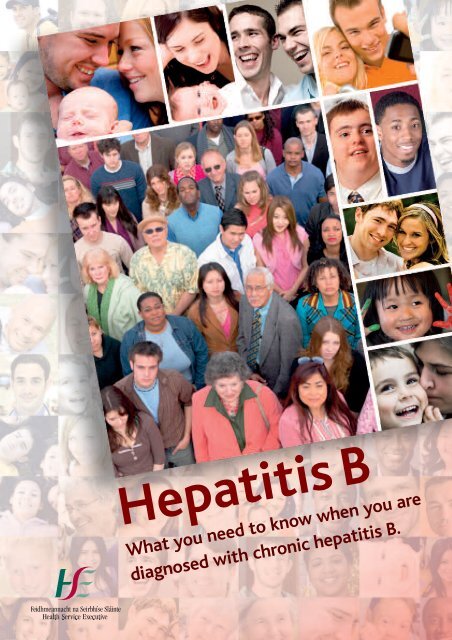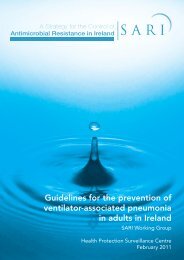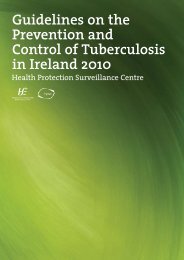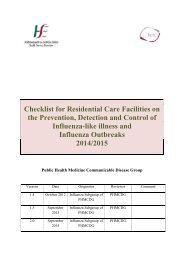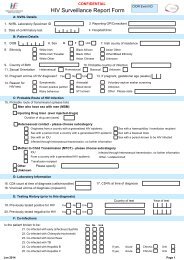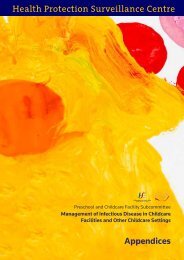Hepatitis B - Health Protection Surveillance Centre
Hepatitis B - Health Protection Surveillance Centre
Hepatitis B - Health Protection Surveillance Centre
Create successful ePaper yourself
Turn your PDF publications into a flip-book with our unique Google optimized e-Paper software.
<strong>Hepatitis</strong> B<br />
What you need to know when you are<br />
diagnosed with chronic hepatitis B.
What is hepatitis B<br />
<strong>Hepatitis</strong> B is a virus that affects the liver and can make you seriously ill. It<br />
can take six weeks to six months from the time you are infected before<br />
symptoms appear. This stage of the illness is called acute hepatitis B.<br />
Some people with acute hepatitis B do not get any symptoms. If you do get<br />
symptoms, these can include: fever, nausea, tiredness, swollen tummy, pain,<br />
jaundice (yellow skin and eyes) and dark urine.<br />
Most people with acute hepatitis B recover fully, but it can take up to six<br />
months or even longer.<br />
Some people do not feel unwell but can continue to carry the virus in<br />
their blood. This is called chronic hepatitis B.<br />
A small number of people become very ill and may get liver failure or longterm<br />
liver problems.<br />
What is chronic hepatitis B<br />
Some people never get rid of the virus. You may stay infected for life and<br />
can spread hepatitis B to others. This is called chronic hepatitis B and people<br />
who have it are “carriers.”<br />
You may feel healthy for your entire life and not show evidence of liver<br />
damage. Some people develop more severe liver disease, such as liver<br />
scarring (cirrhosis), liver failure or cancer. If you have hepatitis B, you can<br />
still get other types of hepatitis such as hepatitis A or C.
Is there treatment for hepatitis B<br />
Your doctor should refer you to a specialist who can check for liver disease<br />
and find out if medicines might help you.<br />
How can I take care of my liver<br />
It is important that you take care of yourself.<br />
• Do not drink alcohol. Alcohol can damage your liver.<br />
• If you are a hepatitis B carrier your doctor should refer you to a specialist to<br />
check for liver disease and find out if medicines might help you.<br />
• See your doctor regularly.<br />
• Check with your doctor before taking any new medicines, over-the-counter<br />
medicines and herbal medicines.<br />
• Get tested for hepatitis C and check if you need to get vaccinated against<br />
hepatitis A.<br />
• Get a yearly flu vaccine.<br />
How did I get hepatitis B<br />
<strong>Hepatitis</strong> B is spread by contact with the blood or body fluids of an infected<br />
person. You can catch hepatitis B if you:<br />
• Have sex with a person carrying hepatitis B.<br />
• Share needles or other equipment when injecting drugs.<br />
• Use un-sterilised needles for body piercing, tattooing, acupuncture,<br />
electrolysis, or for injection.
• Share razors, toothbrushes, washcloths, towels or nail clippers that might<br />
have blood or other body fluids on them.<br />
• Come in contact with bleeding sores or cuts of an infected person.<br />
• Are a health care worker exposed to infected blood or body fluids at work.<br />
• Live with someone who is a hepatitis B carrier.<br />
• Are the child of a hepatitis B carrier.<br />
Can I spread hepatitis B to others<br />
People can get hepatitis B from you through contact with your blood,<br />
semen or vaginal fluids. It can occasionally be spread by human bites. The<br />
virus can live outside the body for up to one week.<br />
Your contacts, such as your partner, family or anyone who lives with you<br />
should have a blood test to check if they have hepatitis B.<br />
Is the hepatitis B vaccine safe<br />
The hepatitis B vaccine is safe and effective. Your partner, family and anyone<br />
who lives with you can protect themselves with vaccination.<br />
The vaccine is usually given in three doses by your family doctor - at the<br />
first visit, one month later and six months after the first injection.<br />
Occasionally the doses are given more quickly.<br />
Some people may need additional doses of vaccine before they are<br />
protected. A very small number of people do not respond to the vaccine and<br />
are not protected.
How can I protect others from hepatitis B<br />
infection<br />
Here is what you need to do to protect others:<br />
• Cover any cuts and open wounds with a band-aid or bandage.<br />
• Wash your hands well after touching your blood or body fluids.<br />
• Put tissues or other products, soiled with blood or body fluids, in a bag<br />
before you throw them in a bin.<br />
• Clean up your blood spills. Then re-clean the area with bleach solution (one<br />
part household bleach to 10 parts water).<br />
• Do not share toothbrushes, razors, needles for ear piercing, nail files, nail<br />
clippers, nail scissors, washcloths or towels.<br />
• If you inject drugs, stop injecting or get into a rehab program. Never share<br />
drugs, needles, syringes, cotton, water or rinse cups.<br />
• Do not donate blood, plasma, body organs, tissue or sperm.<br />
• Your sex partner is at risk of getting hepatitis B from you. Tell your sex<br />
partner(s) that you have hepatitis B. They must see a doctor for a blood test<br />
to see if they are infected. If they are not infected they should be vaccinated.<br />
After the course of injections a blood test will make sure they are protected.<br />
Use condoms until your partner is protected.<br />
• Other people living in your home are at risk. Tell everyone who lives with<br />
you that they should see their doctor for a blood test and vaccination.<br />
• Tell any new sex partners and any new people living with you that they<br />
should get tested and vaccinated.
• If you are pregnant, the new baby needs to get the vaccine and hepatitis B<br />
immunoglobulin (HBIG) shortly after birth.<br />
• If someone is exposed to your blood they can be protected from hepatitis B<br />
if they get treatment quickly. They should go to their doctor or Emergency<br />
Department and say they have been in contact with hepatitis B. They will get<br />
an injection of hepatitis B immunoglobulin (HBIG) and start the hepatitis B<br />
vaccine course.<br />
• Tell your family doctor and dentist that you have hepatitis B.<br />
You should not be excluded from childcare, school, work or other activities<br />
because you have hepatitis B. If you need advice about hepatitis B and your<br />
work, your specialist will advise you.<br />
How can I protect my baby against hepatitis<br />
B if I am pregnant<br />
If you get pregnant, your baby is at risk of getting hepatitis B from you during<br />
or shortly after birth. This can be prevented.<br />
• Your baby should get an injection of hepatitis B immunoglobulin (HBIG) and<br />
the first dose of hepatitis B vaccine within 24 hours of birth.<br />
• Make sure your baby completes the hepatitis B vaccine course at the right<br />
time. A blood test 2 months later will check that they are protected.
You cannot spread hepatitis B by<br />
• Sneezing or coughing<br />
• Kissing or hugging<br />
• Breastfeeding<br />
• Food or water<br />
• Sharing dishes or glasses<br />
• Casual contact (such as at work)<br />
Remember:<br />
Advise your contacts they should be vaccinated.<br />
Use a condom during sex to protect your partner and yourself.
Remember:<br />
Advise your contacts they should be<br />
vaccinated.<br />
Use a condom during sex to protect your<br />
partner and yourself.<br />
How can I learn more<br />
Useful information on hepatitis B can be found from the<br />
following sources:<br />
• Your family doctor<br />
• Local public health department of the HSE<br />
You can get other information and leaflets about hepatitis B on<br />
the following websites<br />
• www.hpsc.ie<br />
• www.cdc.gov/ncidod/diseases<br />
• www.who.int<br />
• www.immunisation.ie<br />
• www.emitoolkit.ie<br />
Date: November 2012<br />
Review date: November 2015<br />
Authors: <strong>Hepatitis</strong> Working Group of the Public <strong>Health</strong> Medicine Communicable Disease Group,<br />
Departments of Public <strong>Health</strong> and <strong>Health</strong> <strong>Protection</strong> <strong>Surveillance</strong> <strong>Centre</strong>,<br />
<strong>Health</strong> Service Executive.


